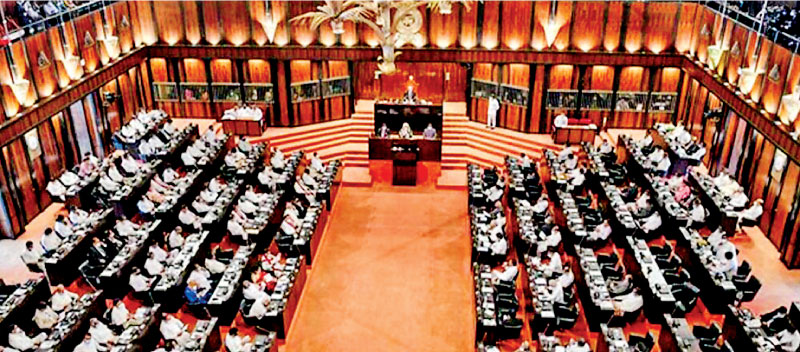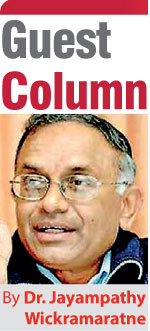Monday Feb 16, 2026
Monday Feb 16, 2026
Friday, 12 May 2023 02:30 - - {{hitsCtrl.values.hits}}

Although our Constitution allows even a sitting Member of Parliament to be appointed as a Governor, it is best that active politicians are not appointed
 There has been talk, for a few months, of new governors being appointed to some provinces. According to media reports, there is an agreement between the Sri Lanka Podujana Peramuna, the main party in Parliament, and the President’s United National Party that four nominees of the latter should be appointed as governors. A spokesperson for the Presidential Secretariat has stated that four incumbent Governors have been requested to resign, adding that it is the tradition that Governors would resign when a new President is appointed. The names of prominent active members of the United National Party are mentioned as possible appointees.
There has been talk, for a few months, of new governors being appointed to some provinces. According to media reports, there is an agreement between the Sri Lanka Podujana Peramuna, the main party in Parliament, and the President’s United National Party that four nominees of the latter should be appointed as governors. A spokesperson for the Presidential Secretariat has stated that four incumbent Governors have been requested to resign, adding that it is the tradition that Governors would resign when a new President is appointed. The names of prominent active members of the United National Party are mentioned as possible appointees.
The main constitutional provisions relating to the Governor are found in Article 154B. The Governor is appointed by the President and holds office, in accordance with Article 4(b), ‘during the pleasure of the President’. The Governor’s term of office is five years, and there is no bar to re-appointment. Article 156(1) of the Indian Constitution provides similarly: The Governor shall hold office during the pleasure of the President.
A former Chief Justice has opined that the only process by which a Governor could be removed is the one set out in Article 154B(4). According to that constitutional provision, a Provincial Council may present an address to the President advising the removal of the Governor on the ground that the Governor has intentionally violated the provisions of the Constitution, is guilty of misconduct or corruption involving the abuse of the powers of his office or is guilty of bribery of an offence involving moral turpitude. A resolution for such purpose must be signed by not less than one-half of the whole number of members and be passed by not less than two-thirds of the whole number of members, including those not present. A question that can be raised is whether such an address binds a President to remove a Governor.
The former Chief Justice has also questioned the propriety of a President who has succeeded to the office of President, removing a Governor who has been appointed by a President elected directly by the People.
Qualifications to be appointed as a Governor are not laid down in the Constitution, except that upon assumption of office, a Governor shall cease to hold any other office created or recognised by the Constitution and, if he is a Member of Parliament, shall vacate his seat in Parliament. A Governor shall not hold any other office or place of profit. In India, the only qualifications are that the person be a citizen and be not less than 35 years.
In Sri Lanka, former judges, retired public servants and retired military officers have been appointed. On the other extreme, serving Ministers have given up their seats in Parliament to accept appointments as Governors. Successive governments have appointed active politicians. Many continued to be active even while holding the position. A particular Governor continued to be the chief organiser of the ruling party in an electorate coming within the same province! There have been reports of politically active Governors using their positions for political ends.
In Rameshwar Prasad v Union of India, the Indian Supreme Court critically examined the role of the Governor and referred extensively to the 1988 Report of the Justice Sarkaria Commission on Centre-State Relations.
The Sarkaria Commission had stated that the key to restoring the prestige of the Governor’s office lay in picking the right person for the sensitive constitutional post. Apart from the constitutionally prescribed qualifications, the report listed a few more — that the person should be eminent in some walk of life, be from outside the State, be a detached figure having little connection with local politics and that he must not have taken too great a part in politics generally and particularly in the recent past.
The Supreme Court observed as follows: ‘Unfortunately, the criteria have been observed in almost total breach by all political parties. It is seen that one day a person is in active politics in as much as he holds the office of the chief minister or minister or a party post and almost on the following day or, in any case, soon thereafter, the same person is appointed as Governor in another state with hardly any cooling off period. Ordinarily, it is difficult to expect detachment from party politics from such a person while performing the constitutional functions as governors.’
The Punchhi Commission on Centre-State Relations, headed by a former Chief Justice of India, recommended in its 2010 report that a nominee should not have participated in active politics even at the local level for at least a couple of years before his appointment. It also agreed with the Sarkaria Commission’s recommendation that a Governor should be an eminent person and not belong to the State where he is to be posted.
One may argue that as the Governor holds office at the pleasure of the President, he could be removed by the President at any time. On the other hand, does the President have the power to dismiss a Governor without a valid reason? The Governor of the Western Province, former Chief Justice S. Sharvananda, was removed by President D.B. Wijetunge after he removed a Minister as advised by the Chief Minister in the Opposition-controlled Provincial Council, despite pressure brought on him by the Government.
B.P. Singhal v Union of India concerned the removal of the Governors of Uttar Pradesh, Gujarat, Haryana and Orissa by the new UPA Government in 2004. The Indian Supreme Court held that although the President can remove the Governor from office at any time without assigning any reason and without giving any opportunity to show cause, that power cannot be exercised in an arbitrary, capricious or unreasonable manner. The power should be exercised in rare and exceptional circumstances for valid and compelling reasons. A Governor cannot be removed on the ground that he is ‘out of sync’ with the policies and ideologies of the party in power at the Centre. Nor can he be removed on the ground that the Union Government has lost confidence in him. It follows, therefore, that change in the government at the Centre is not a ground for the removal of Governors holding office to make way for others favoured by the new government.
As to who should be appointed as Governors, the Court stated: ‘Reputed elder statesmen, able administrators and eminent personalities, with maturity and experience are expected to be appointed as Governors. While some of them may come from a political background, once they are appointed as Governors, they owe their allegiance and loyalty to the Constitution and not to any political party and are required to preserve, protect and defend the Constitution.’
The Steering Committee of the Constitutional Assembly of the previous Parliament, chaired by Prime Minister Ranil Wickremesinghe, was of the view that a constitutional provision should be made to prohibit the Governor from engaging in party politics while holding office.
Although our Constitution allows even a sitting Member of Parliament to be appointed as a Governor, it is best that active politicians are not appointed. As the Indian Supreme Court and the Sarkaria and Punchhi Commissions have pointed out, there must be a ‘cooling off’ period of at least two years before a former politician is appointed.